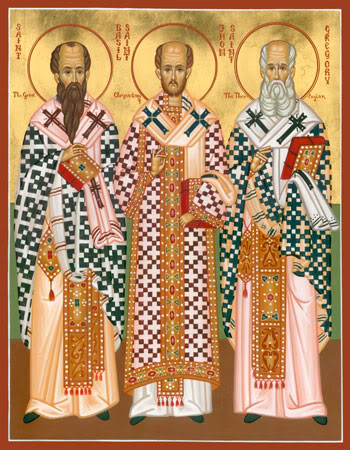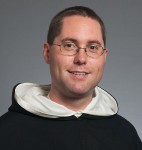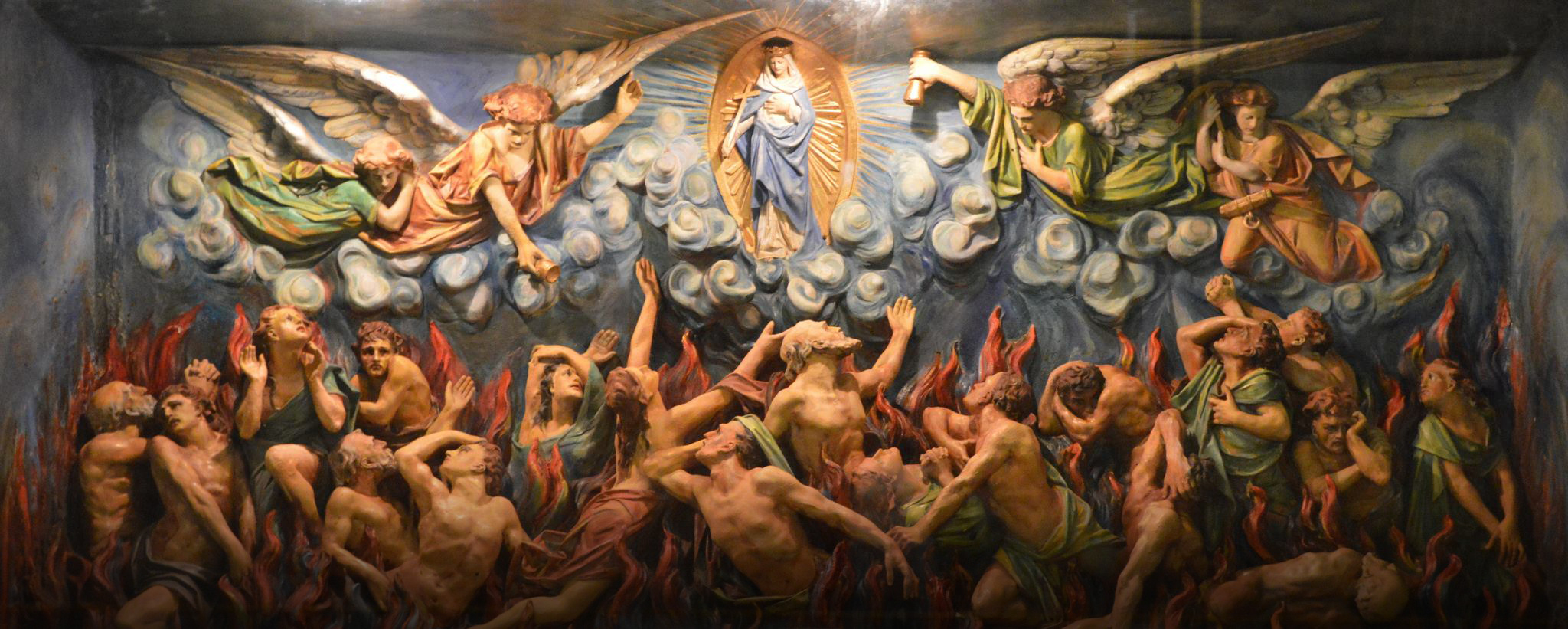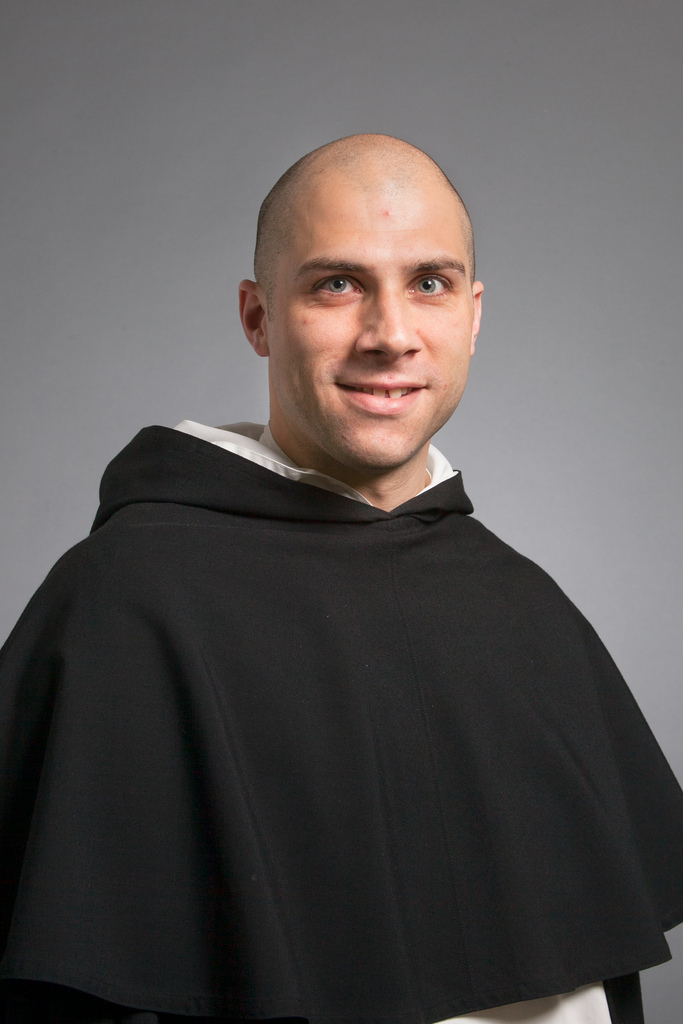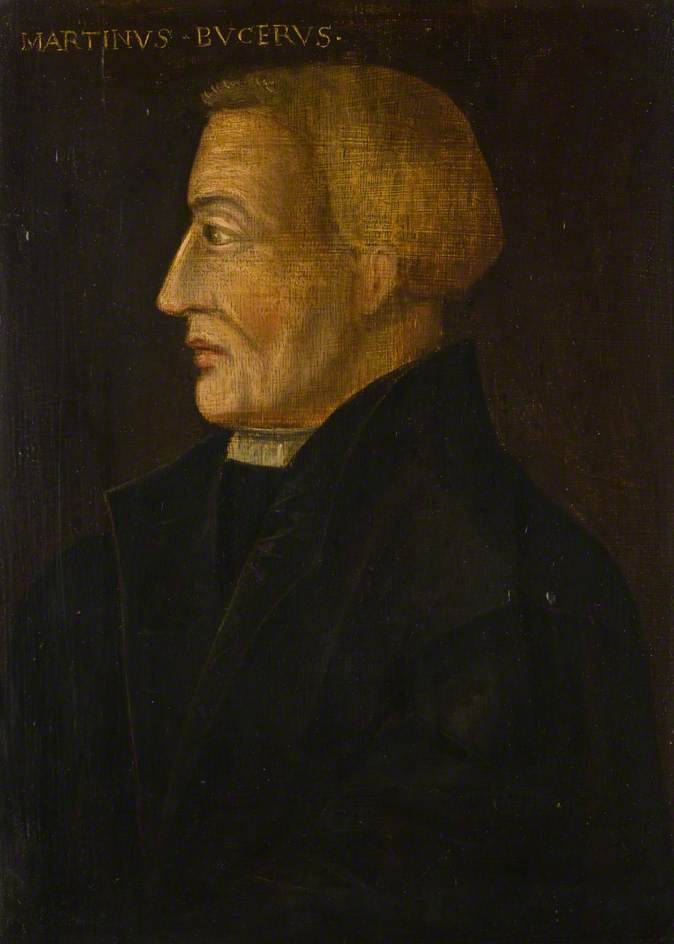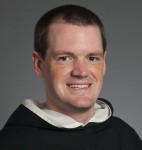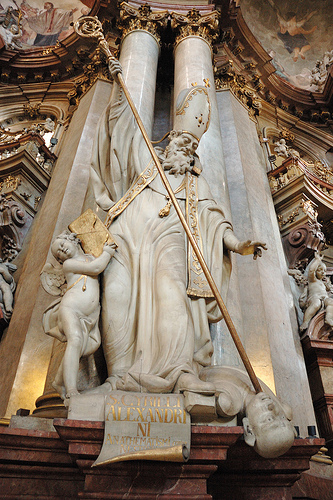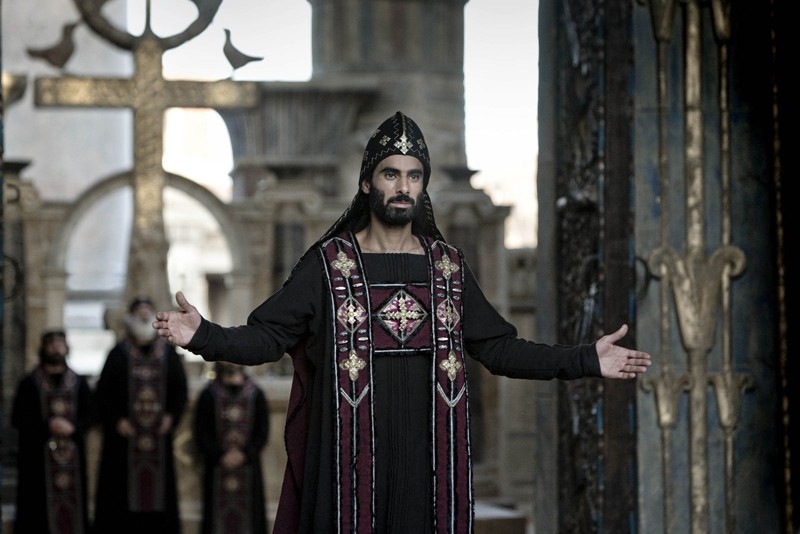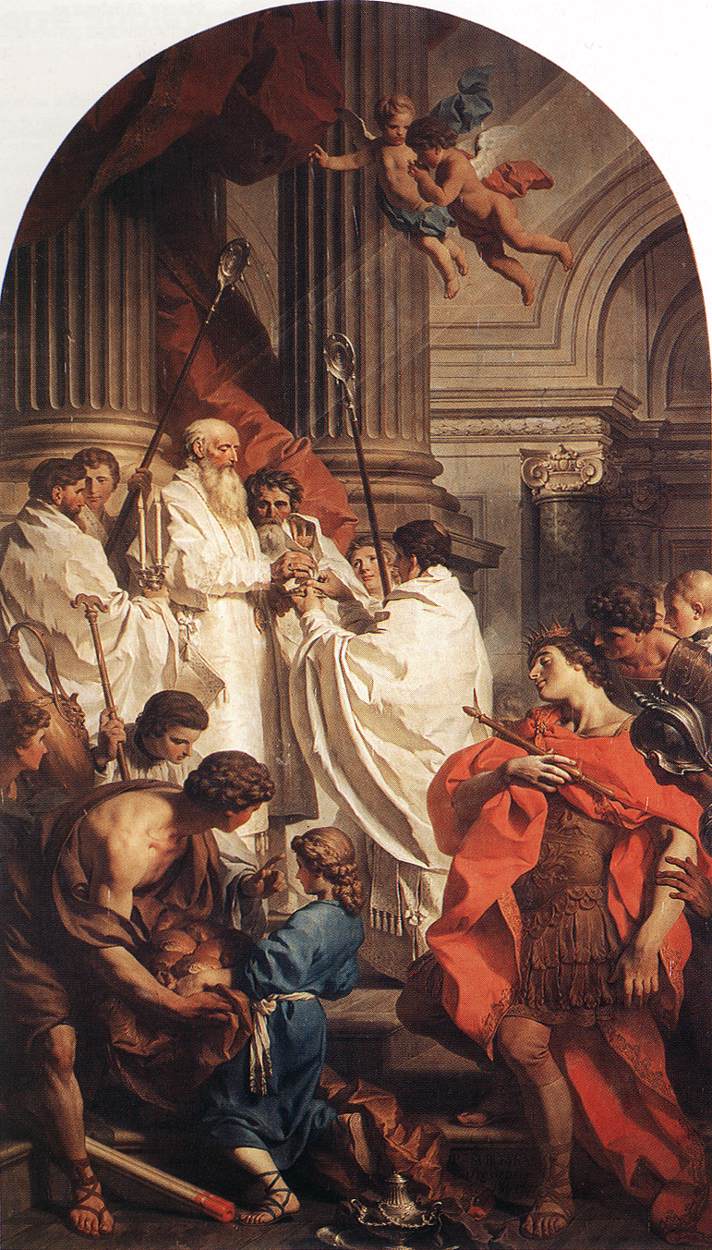
–“The Mass of Saint Basil” by Pierre Subleyras (1699–1749). An altarpiece painted in 1743, and originally destined for Saint Peter’s in Rome, it is now in The Hermitage Museum in St. Petersburg.
“Both St. Basil and St. Gregory were friends, both were born in the early fourth century, and both were schooled at Athens in rhetoric—a skill they taught for pay until they sold everything and entered monastic life in Pontus, Asia Minor. Both became bishops of important sees in the eastern part of the Roman Empire. Basil (the Great) was the ecclesial speaker and administrator, and Gregory of Nazianzus (the Theologian) was the poet and rhetorical mastermind, writing forty-five orations and over seventeen thousand lines of poetry. Along with many other theological works, both are known for their early and compelling arguments that the Holy Spirit is in fact God.
Fourth-century views on the Holy Spirit were varied. Some pagans aware of Christian doctrine called the Spirit an external mind or activity that ordered the cosmos. Some who professed Christ’s divinity still contended with the Spirit’s divinity, thinking of him as a creature, lesser in honor than the Father and Son, but still worthy of respect. These latter Basil and Gregory called the Spirit-Fighters (pneumatomachoi), against whom they dedicated the weight of their talent by defending and explaining the Church’s teaching on the Holy Spirit’s divinity.
In On the Holy Spirit, Basil argues, from the tradition of the Church and the baptismal formulation in Matthew’s Gospel, that the Holy Spirit is rightly counted with the Father and Son as God.
“What makes us Christians? “Our faith,” everyone would answer. How are we saved? Obviously through the regenerating grace of baptism. How else could we be? We are confirmed in our understanding that salvation comes through the Father, Son, and Holy Spirit . . . If we now reject what we accepted at baptism, we will be found further away from our salvation than when we first believed.” – On the Holy Spirit, 10
Basil’s point is clear: we are saved by the regenerating waters of baptism, whereby we receive grace from the Father, Son, and Holy Spirit. This is a tradition that comes from Christ himself in his commission to the apostles to baptize “in the name of the Father, and of the Son, and of the Holy Spirit” (Mt. 28:19).
Gregory of Nazianzus, in his fifth Theological Oration, reinforces Basil’s conclusion. Calling the Holy Spirit anything less than God only leaves us with further questions about our salvation. Man is called to worship the One who elevates and saves him, and this belongs to God alone. Since it is the Spirit in whom we worship and are baptized, failing to call the Spirit divine along with the Father and Son would detract from what belongs to God.
“Were the Spirit not to be worshipped, how could He deify me through baptism? If He is to be worshipped, why not adored? And if to be adored, how can He fail to be God?” – Oration 31.28
Basil and Gregory realized that our worship of the Holy Spirit is tied to His role in creating and saving us. Something can only act from the way it exists. Therefore, if the Holy Spirit acts in our lives as God would do (namely, by creating and saving us), that is because He is God. In fact, any significant function belonging to God is also performed by the Holy Spirit. Scripture calls the Spirit the Sanctifier Who makes us holy, the Comforter Who widens our hearts, and the Advocate sent by the Son from the Father to teach us all things. He is called the “Spirit of God,” the “Spirit of Christ,” the “Spirit of the Lord,” and just simply “Lord,” to name a few titles. These are deeds and names that correspond to a divine Person, that is, one acting according to the same divine nature as that instantiated by the Father and the Son.
To show this, Gregory of Nazianzus refers us to John’s Gospel, which recounts Christ’s telling of the Holy Spirit’s work and mission in the world: “But when the Counselor comes, Whom I shall send to you from the Father, even the Spirit of truth, Who proceeds from the Father, He will bear witness to Me” (Jn 15:26).
Prior to His death and rising, Christ promised to send us the Spirit of truth from the Father. Proceeding from the Father and the Son, the Holy Spirit bears witness to Christ’s saving work, just as Christ’s own divinity and earthly mission are grounded in His being begotten of the Father. Because of His place among the divine Persons of the Trinity, the Spirit is One with the Father and the Son in that same divinity. Following the words of Gregory and Basil, may we, in our worship of God, give thanks for our rebirth and re-creation in the Spirit, and may our recognition of this work of the Spirit in our lives cause us rightly to call Him divine.”
-“The Three Holy Hierarchs” -St Basil, St John Chrysostom, & St Gregory Nazianzus, an icon of 17th cent. from Lipie, Historic Museum in Sanok, Poland
“God accepts our desires as though they were of great value. He longs ardently for us to desire and love Him. He accepts our petitions for benefits as though we were doing Him a favor. His joy in giving is greater than ours in receiving. So let us not be apathetic in our asking, nor set too narrow bounds to our requests; nor ask for frivolous things unworthy of God’s greatness.” – Saint Gregory Nazianzen
“Let us not esteem worldly prosperity or adversity as things real or of any moment, but let us live elsewhere, and raise all our attention to Heaven; esteeming sin as the only true evil, and nothing truly good, but virtue which unites us to God.” – Saint Gregory Nazianzen
“Basil and I were both in Athens. We had come, like streams of a river, from the same source in our native land, had separated from each other in pursuit of learning, and were now united again as if by plan, for God so arranged it. When, in the course of time, we acknowledged our friendship and recognized that our ambition was a life of true wisdom, we became everything to each other; we shared the same lodging, the same table, the same desires, the same goal. Our love for each other grew daily warmer and deeper. The same hope inspired us: the pursuit of learning. We seemed to be two bodies with a single spirit. Our single object and ambition was virtue, and a life of hope in the blessings that are to come. We followed the guidance of God’s law and spurred each other on to virtue. If it is not too boastful to say, we found in each other a standard and rule for discerning right from wrong. Different men have different names, which they owe to their parents or to themselves, that is, to their own pursuits and achievements. But our great pursuit, the great name we wanted, was to be Christians, to be called Christians.” – from a sermon by Saint Gregory Nazianzen
“Today let us do honor to Christ’s baptism and celebrate this feast in holiness. Be cleansed entirely and continue to be cleansed. Nothing gives such pleasure to God as the conversion and salvation of men, for whom his every word and every revelation exist. He wants you to become a living force for all mankind, lights shining in the world. You are to be radiant lights as you stand beside Christ, the great light, bathed in the glory of him who is the light of heaven. You are to enjoy more and more the pure and dazzling light of the Trinity, as now you have received – though not in its fullness – a ray of its splendor, proceeding from the one God, in Christ Jesus our Lord, to whom be glory and power for ever and ever. Amen.” – from a sermon by Saint Gregory Nazianzen on the Feast of the Baptism of the Lord
“He is given vinegar to drink mingled with gall. Who? He who turned water into wine, the destroyer of the bitter taste Who is sweetness and altogether desire.” -St Gregory of Nazianzus
“O sinner, be not discouraged, but have recourse to Mary in all you necessities. Call her to your assistance, for such is the divine Will that she should help in every kind of necessity.” – Saint Basil the Great
“The time of our separation is not long, for in this life we are all like travelers on a journey, hastening on to the same shelter.”
-St. Basil the Great
“The Lord does not say that the proof of His disciples’ faithfulness will be the working of wondrous miracles…what does He tell them? ‘You shall be known as my disciples if you love one another.'” -St. Basil the Great
“Give something, however small, to the one in need. For it is not small to one who has nothing. Neither is it small to God, if we have given what we could.” -St. Gregory Nazianzen
“A tree is known by its fruit; a man by his deeds. A good deed is never lost; he who sows courtesy reaps friendship, and he who plants kindness gathers love.”
-St. Basil
“There is still time for endurance, time for patience, time for healing, time for change. Have you slipped? Rise up. Have you sinned? Cease. Do not stand among sinners, but leap aside.”
-St. Basil the Great
“My son, have a care above all things of humility, for this, of all virtues, is the most sublime, and the ladder whereby to reach the summit of perfection.”
-St. Basil the Great
“The same Lord who divided the islands from the continent by the sea bound the island Christians to the continental by love.” -St. Basil the Great
“By the command of Your only-begotten Son we communicate with the memory of your saints…by whose prayers and supplications have mercy upon us all, and deliver us for the sake of Your holy name.” – Liturgy of Saint Basil, 373AD
“The bread which you use is the bread of the hungry; the garment hanging in your wardrobe is the garment of him who is naked; the shoes you do not wear are the shoes of the one who is barefoot; the acts of charity that you do not perform are so many injustices that you commit.” – Saint Basil
“Let us raise ourselves from our fall and not give up hope as long as we are free from sin. Jesus Christ came into this world to save sinners. ‘Come, let us adore and prostrate ourselves and weep before him’ (Psalm 95:6). The Word calls us to repentance, crying out: ‘Come to me, all you who labor and are heavily burdened and I will refresh you’ (Matthew 11:28). There is, then, a way to salvation if we are willing to follow it” – from a letter by Saint Basil the Great
“Envy is a gnawing pain which springs from the success and prosperity of another; and this is the reason why the envious are never exempt from trouble and vexation. If an abundant harvest fills the granaries of a neighbor, if success crowns his efforts, the envious man is chagrined and sad. If one man can boast of prudence, talent, and eloquence; if another is rich, and is very liberal to the poor, if good works are praised by all around, the envious man is shocked and grieved. The envious, however, dare not speak; although envy makes them counterfeit gladness, their hearts are sore within. If you ask him what vexes him, he dare not tell the reason. It is not really the happiness of his friend that annoys him, neither is it his gaiety that makes him sad, nor is he sorry to see his friend prosper; but it is that he is persuaded that the prosperity of others is the cause of his misery. This is what the envious would be forced to acknowledge, if they spoke the truth sincerely; but because they dare not confess so shameful a sin, they, in secret, feed a sore which tortures them and eats away their rest. As the shadow ever accompanies the pedestrian when walking in the sun, so envy throws its shadow on those who are successful in the world.” – Saint Basil, from “De Individia”
“Thy fame has gone forth into all the earth, which has received thy word. Thereby thou hast taught the Faith; thou hast revealed the nature of created things; thou hast made a royal priesthood of the ordered life of men. Righteous Father Basil intercede with Christ our God that our souls may be saved.” – troparion of Saint Basil the Great
“Thou wast an unshaken foundation of the Church and didst give to all mortals an inviolate lordship which thou didst seal with thy doctrine, O righteous Basil, revealer of the mysteries of heaven.” – kontakion of Saint Basil the Great
“O All-Transcendent God (and what other name could describe You?), what words can hymn Your praises? No word does You justice. What mind can probe Your secret? No mind can encompass You. You are alone beyond the power of speech, yet all that we speak stems from You. You are alone beyond the power of thought, yet all that we can conceive springs from You. All things proclaim You, those endowed with reason and those bereft of it. All the expectation and pain of the world coalesces in You. All things utter a prayer to You, a silent hymn composed by You. You sustain everything that exists, and all things move together to Your orders. You are the goal of all that exists. You are one and You are all, yet You are none of the things that exist – neither a part nor the whole. You can avail yourself of any name; how shall I call You, the only unnameable? All-transcendent God!” –St Gregory Nazianzus
“O God and Lord of the Powers, and Maker of all creation, Who, because of Your clemency and incomparable mercy, did send Your Only-Begotten Son and our Lord Jesus Christ for the salvation of mankind, and with His venerable Cross did tear asunder the record of our sins, and thereby did conquer the rulers and powers of darkness; receive from us sinful people, O merciful Master, these prayers of gratitude and supplication, and deliver us from every destructive and gloomy transgression, and from all visible and invisible enemies who seek to injure us. Nail down our flesh with fear of You, and let not our hearts be inclined to words or thoughts of evil, but pierce our souls with Your love, that ever contemplating You, being enlightened by You, and discerning You, the unapproachable and everlasting Light, we may unceasingly render confession and gratitude to You: The eternal Father, with Thine Only-Begotten Son, and with Thine All-Holy, Gracious, and Life-Giving Spirit, now and ever, and unto ages of ages. Amen.” –St Basil the Great
Christians long ago concluded that each individual human being has his or her own particular guardian angel. Though the Church has never defined the teaching about individual guardian angels, the Catechism of the Catholic Church sums up the matter this way, quoting St. Basil: “From infancy to death human life is surrounded by [the angels’] watchful care and intercession. Beside each believer stands an angel as protector and shepherd leading him to life’. In this light, we can turn to our guardian angels for help in spiritual warfare, especially to resist the temptations of the Enemy. Yet angels are more than guardians; they are also warriors.”
“The best guide you can find to the correct path is the serious study of the Bible. There we can find rules for the conduct of our life and […] each person can concentrate on the area where they feel themselves to be lacking and find, as in a hospital, a cure for their particular trouble.”
—St. Basil the Great
“The bread you store up belongs to the hungry; the cloak that lies in your chest belongs to the naked; the gold you have hidden in the ground belongs to the poor.”
–St. Basil the Great
“Can any man endued with reason persuade himself that dumb statues are gods?”
—St. Basil to the Emperor
“Give something, however small, to the one in need. For it is not small to one who has nothing. Neither is it small to God, if we have given what we could.”
—St. Gregory Nazianzen
“As the pilot of a vessel is tried in the storm; as the wrestler is tried in the ring, the soldier in the battle, and the hero in adversity: so is the Christian tried in temptation.”
–St. Basil the Great
“It is necessary to confess our sins to those to whom the dispensation of God’s mysteries is entrusted. Those doing penance of old are found to have done it before the saints. It is written in the Gospel that they confessed their sins to John the Baptist [Matt. 3:6], but in Acts [19:18] they confessed to the apostles.” -St Basil the Great (Rules Briefly Treated, 288 [A.D. 374])
“When you sit down to eat, pray. When you eat bread, do so thanking Him for being so generous to you. If you drink wine, be mindful of Him who has given it to you for your pleasure and as a relief in sickness. When you dress, thank Him for His kindness in providing you with clothes. When you look at the sky and the beauty of the stars, throw yourself at God’s feet and adore Him who in His wisdom has arranged things in this way. Similarly, when the sun goes down and when it rises, when you are asleep or awake, give thanks to God, who created and arranged all things for your benefit, to have you know, love and praise their Creator.”
–St. Basil the Great
Love,
Matthew


